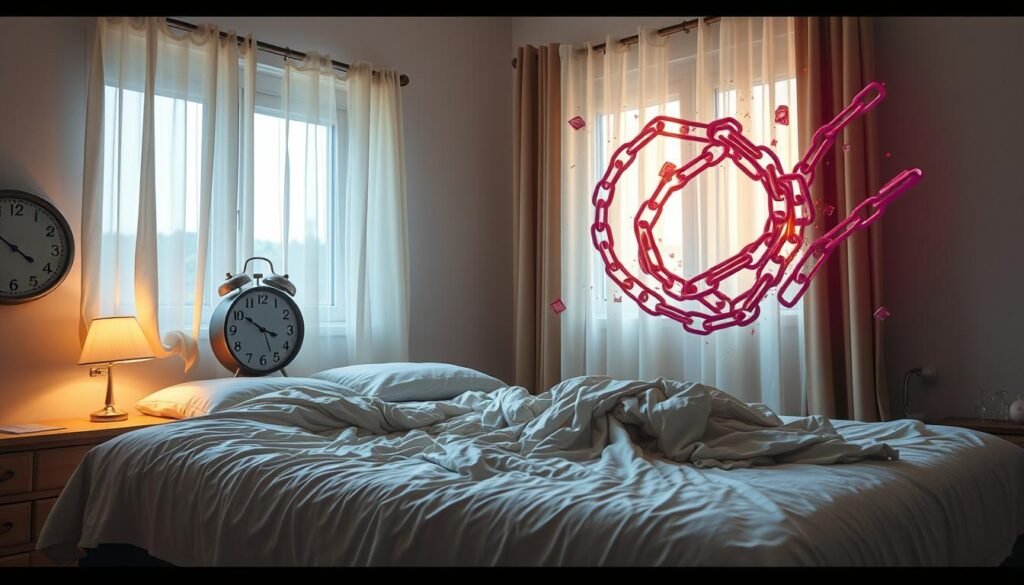About 40% of Americans feel overly sleepy during the day. This huge number points to a common issue linked to bad sleep habits. In the quick pace of today’s world, it’s crucial to make good sleep a priority. Not getting enough sleep hurts our bodies and minds. It can lead to anxiety and depression. But, by creating better sleep routines, people can enjoy their nights more and have better days.
Want to learn more about bad sleep habits and find ways to sleep better? You can check out resources like this guide. It helps you understand which habits are ruining your sleep. By knowing this, you can start to sleep more soundly.
Key Takeaways
- Adults require at least seven hours of sleep for optimal health.
- Children and teenagers need more sleep, typically 7 to 8 hours nightly.
- Maintaining a consistent sleep routine can enhance sleep quality.
- Engaging in relaxation techniques can improve the ability to fall asleep.
- A calm, dark, and comfortable sleeping environment is crucial for better sleep.
- Managing stress and reducing caffeine can mitigate insomnia.
- Understanding and aligning with circadian rhythms supports overall well-being.
The Importance of Quality Sleep
Getting enough sleep is key to keeping your emotions and thoughts in check. When we sleep deeply, our brains work hard. They store memories and help us manage stress. The National Library of Medicine says adults need at least seven hours of sleep each night to be their best. Yet, not sleeping enough can lead to health problems. These include more stress and anxiety, which lower our productivity and life quality.
Sleep problems are more common now, so it’s vital to know how important good sleep is. Kids in school should get at least nine hours of sleep. Teens need about eight to ten hours. Adults should aim for at least seven hours for good mental health. Not getting enough sleep can make us tired and upset more easily.
This lack of sleep is worrying. It can make stress and mental health issues worse. The link between bad sleep and our physical health is big. Quality sleep means more than just staying in bed for a long time. It’s about getting deep, healing sleep that makes our bodies and minds feel refreshed.
| Age Group | Recommended Hours of Sleep |
|---|---|
| Newborns (0-3 months) | 14-17 hours |
| Infants (4-12 months) | 12-16 hours |
| Toddlers (1-2 years) | 11-14 hours |
| School-age Children (6-12 years) | 9-12 hours |
| Teens (13-17 years) | 8-10 hours |
| Adults (18-60 years) | At least 7 hours |
| Adults (61+ years) | 7-9 hours |
Poor Sleep Habits and Their Impact on Mental Health
Poor sleep habits do more than just disrupt sleep. They are deeply linked with mental health. When stressed, many people feel more anxious. This anxiety can make sleeping even harder.
This cycle worsens both sleep and anxiety. Not sleeping well can mess up how we handle our feelings. It becomes a big problem for emotional control.
Understanding the Sleep-Anxiety Connection
Research has uncovered a strong link between sleep and anxiety. This was especially clear during the COVID-19 pandemic. A Sleep Medicine study found that 1 in 3 adults showed signs of insomnia after feeling more stressed. Around 56% of Americans had trouble sleeping then. It shows how close sleep issues and anxiety are.
How Sleep Deprivation Affects Emotional Regulation
Lack of sleep greatly impacts how we control our emotions. Those with bad sleep habits often react more emotionally. This makes them more prone to anxiety. Not being able to manage emotions can make thinking clearly hard.
Insomnia and anxiety disorders affect nearly 20% of adults. They greatly disrupt everyday life. Improving sleep is key for better emotional health and lower anxiety.
Recognizing the Symptoms of Poor Sleep Habits
Knowing the signs of bad sleep habits is critical. It helps point out problems like insomnia. This knowledge lets people start working on getting better sleep.
Identifying Insomnia and Its Effects
Insomnia shows up as trouble falling or staying asleep. Those dealing with it often feel frustrated and tired. About 20% of U.S. adults sleep less than five hours a night, which is not enough.
Living with chronic insomnia is tough. It causes people to be easily upset, anxious, and moodier than usual.
Understanding Sleep Disorders and Their Influence
Many sleep disorders can make insomnia worse. Sleep apnea is one, causing you to wake up often at night. This leads to feeling very tired during the day.
Between 50 and 70 million U.S. adults have sleep problems. This affects thinking and how one feels. Recognizing sleep issue signs is key to getting help.
Establishing Healthy Bedtime Routines
A good bedtime routine helps you sleep better. It often includes calming activities before bed. Things like reading, a warm bath, or soft music tell your body it’s time to rest. Sticking to a regular bedtime trains your brain to get tired at the right time.
Sleep hygiene tips can turn a bedtime routine into a soothing ritual. Setting an alarm to start winding down works well. This gives your mind time to relax, improving sleep.
It’s key to cut down on using screens before bed. They give off blue light which can mess with sleep. Try light snacks or herbal teas like chamomile instead to feel calm.
Making your sleep space ideal is crucial. A cool, dark, and quiet room helps you relax. The best temperature is about 65 to 68 degrees Fahrenheit. Blackout curtains and essential oils can make your room even more peaceful.
Relaxation methods like meditation or stretching can ease tension. They get your body and mind ready for sleep. A steady bedtime routine betters sleep hygiene and leads to restful nights.
Enhancing Your Sleep Environment
Your sleep space is key for good rest. Making it peaceful boosts how well you sleep. Small changes can make a big difference, like better melatonin production and more comfort at night.
Creating a Peaceful and Dark Sleeping Space
Darkness tells your body it’s time for sleep. Using blackout curtains or eye masks helps block light, making it easier to fall asleep. It’s also important to cut down on electronic use and keep your space neat. This reduces stress and helps you relax.
Importance of Temperature and Noise Control
A cool room is best for sleeping. Adjusting the thermostat can improve your sleep. Controlling noise is key too. White noise machines or earplugs can block out disturbing sounds. These steps create the perfect setting for deep sleep.
Understanding Circadian Rhythm Disruption
Circadian rhythms help regulate our sleep and health. When disturbed, we might face sleep loss, hormonal issues, and thinking troubles. Learning what disrupts our natural patterns is key. It helps us find ways to fix our circadian rhythms.
Factors Leading to Circadian Rhythm Disruption
Many things can throw off our circadian rhythm, harming our body and mind. Key factors include:
- Shift work: Working nights or rotating shifts messes with our sleep, causing insomnia and tiredness during the day.
- Jet lag: Flying across time zones upsets our internal clock, making us irritable and unfocused.
- Screen exposure: Too much screen time before bed reduces melatonin, important for sleep.
- Health conditions: Conditions like DSP and ASP show how aging and lifestyle affect sleep.
Strategies to Improve Circadian Alignment
To fix our circadian rhythm, we can try certain methods. Consider these approaches:
- Bright light therapy: Bright light at the right time can help adjust our body’s clock.
- Consistent sleep-wake schedules: Sleeping and waking up at consistent times aids our natural rhythm.
- Melatonin supplements: These may help signal our body to rest, especially for those with rhythm problems.
- Healthy lifestyle choices: Exercise and a good diet help our body clock run smoothly.
Working toward a balanced circadian rhythm can boost our sleep, mood, and overall health.

Sleep Hygiene: The Foundation for Better Rest
Maintaining effective sleep hygiene improves sleep quality. Daily habits that foster good sleep can boost well-being and brain function. Including regular exercise and a calming routine before bed is essential.
Daily Habits That Promote Quality Sleep
Positive daily habits are crucial for better sleep. Being active helps regulate your sleep patterns. Just 30 minutes of exercise each day can lead to improved sleep.
It’s important to limit caffeine and alcohol before bed. The 10-3-2-1-0 sleep rule is a great guide: no caffeine 10 hours before bed, no food or alcohol 3 hours before, no work 2 hours before, no screens 1 hour before, and avoid snoozing.
A comfy mattress and a relaxing bedtime routine help a lot. About 70% of people who have a consistent sleep schedule get better sleep. Eating healthy, with lots of fruits, veggies, and whole grains, also helps. Check out this sleep hygiene guide for more tips.
The Role of Light Exposure in Sleep Hygiene
Natural light during the day helps you fall asleep at night. Cutting down on artificial light in the evening aids your natural sleep cycle. Blackout curtains can also make your bedroom better for sleeping. Keeping a regular pattern of light and dark helps a lot.
These habits create a good setting for restful sleep. Techniques focusing on mindfulness can help if you have sleep-related anxiety. Learning about poor sleep effects can motivate healthier habits. For anxiety help, this guide might be useful.
| Practice | Benefit |
|---|---|
| Consistent Sleep Schedule | Enhances sleep quality |
| Regular Physical Activity | Improves sleep duration |
| Calming Pre-Bedtime Routine | Facilitates quicker sleep onset |
| Avoiding Caffeine and Alcohol | Reduces sleep disruptions |
| Proper Light Exposure | Aligns circadian rhythms |
Adopting these daily habits can greatly improve your sleep hygiene and night rest.
Poor Sleep Habits: Breaking the Cycle
To break the cycle of poor sleep, you must commit to change. First, figure out what’s going wrong. It’s key to understand how stress, life choices, and where you live affect your sleep.
There are many ways to fix bad sleep habits. Good sleep hygiene, like getting up at the same time every day, helps a lot. Adding exercise to your day can also make you sleepier at bedtime, matching your body’s rhythm.
What you eat and drink matters too. Avoiding caffeine late in the day can calm your body down. Mindfulness, especially meditation that focuses on your breathing, fights insomnia. It makes you feel calmer and sleep better.
Here’s a table of methods to improve sleep and their benefits:
| Method | Description | Benefits |
|---|---|---|
| CBT for Insomnia | Cognitive Behavioral Therapy to address anxiety and insomnia. | Effective in managing sleep disorders, promotes consistent sleep hygiene. |
| Mindfulness Meditation | Focus on breathing and allowing thoughts to drift without attachment. | Reduces anxiety, depression, and chronic pain while enhancing sleep quality. |
| Progressive Muscle Relaxation | Technique to relieve anxiety and prepare the body for sleep. | Improves sleep patterns while reducing stress and pain symptoms. |
| Physical Activity | Engaging in regular exercise. | Enhances sleep drive and overall health. |
Using these strategies can help stop bad sleep habits. You’ll notice many benefits, like feeling happier and healthier.

Napping Habits: The Good and the Bad
Napping boosts energy and well-being. Short, restorative naps improve memory, mood, and focus. But, it’s important to nap properly. Too much or erratic napping might hurt nighttime sleep.
How Naps Can Restore Energy
Short naps recharge you, making tasks easier. A 30-minute nap helps older adults think clearer. But, napping too often could increase health risks. Regular nappers face higher risks of stroke and high blood pressure.
When Naps Become Counterproductive
Napping late or too long can upset night sleep. This leads to next-day grogginess. Long naps also raise risks of diabetes and heart issues. Keep naps under 30 minutes to avoid post-nap sleepiness. See a doctor if you often feel too tired during the day. A good napping environment is key for benefits without downsides.
| Napping Duration | Benefits | Potential Risks |
|---|---|---|
| 20-30 minutes | Improved attention, mood, and memory | Minimal risk |
| 30-60 minutes | Enhanced cognitive function | Possible grogginess |
| Over 60 minutes | Not recommended for general routine | Increased risk of high blood pressure and other health issues |
Learning about your napping and sleep habits is wise. It helps you make better choices for your rest and health. For more on napping risks, click here.
Seeking Professional Help for Sleep Issues
If you can’t sleep well despite trying to improve your habits, it might be time to get professional help. Insomnia is a common problem that stops adults from falling or staying asleep. Health care providers are key in finding why you can’t sleep and offering the right treatment for insomnia.
Cognitive Behavioral Therapy (CBT) is often the go-to method for long-lasting sleep issues like insomnia. It helps by tackling negative thoughts and actions that harm sleep. Part of CBT might involve:
- Changing routines to promote better sleep habits
- Setting sleep limits to avoid excessive time in bed
- Improving the sleep environment for greater comfort
- Learning relaxation strategies to reduce anxiety before bedtime
- Using biofeedback to understand and improve physiological responses
CBT usually needs about six to eight sessions to work well. An effective treatment for insomnia often includes various CBT techniques. This helps in a big way to beat sleep problems.
Prescription sleep aids may help short-term, during very stressful times. However, they’re not the best for long-term use. Studies show that CBT can improve sleep quality long-term, without the negative effects of medication.
Many health problems can make sleep worse, so seeing a professional is important when you have sleep troubles. Issues like chronic pain or depression need to be looked at to manage insomnia well. A mix of lifestyle changes, therapy, and seeing specialists can help people get better.
For advice on handling sleep problems caused by anxiety, check out this resource. It shows how treating mental health is key in sleep therapy.

Conclusion
To fight bad sleep habits, we need a plan that looks at our body’s needs, setting up good bedtime routines, and making a sleep-friendly place. These steps can really help improve how well we sleep and make us feel better overall.
Research points out that mental health issues, stress, and noisy or bright bedrooms can make sleep worse. For instance, a big study found that 67.2% of college students said stress and mental struggles made their sleep bad. If we deal with these problems early, we can sleep better.
Good sleep hygiene makes a big difference in how well we sleep. A study shows that 76.5% of folks with bad sleep habits had trouble sleeping. So, building good sleep routines can help us enjoy deeper and more refreshing sleep. Taking these steps paves the way for a healthier life with better sleep.